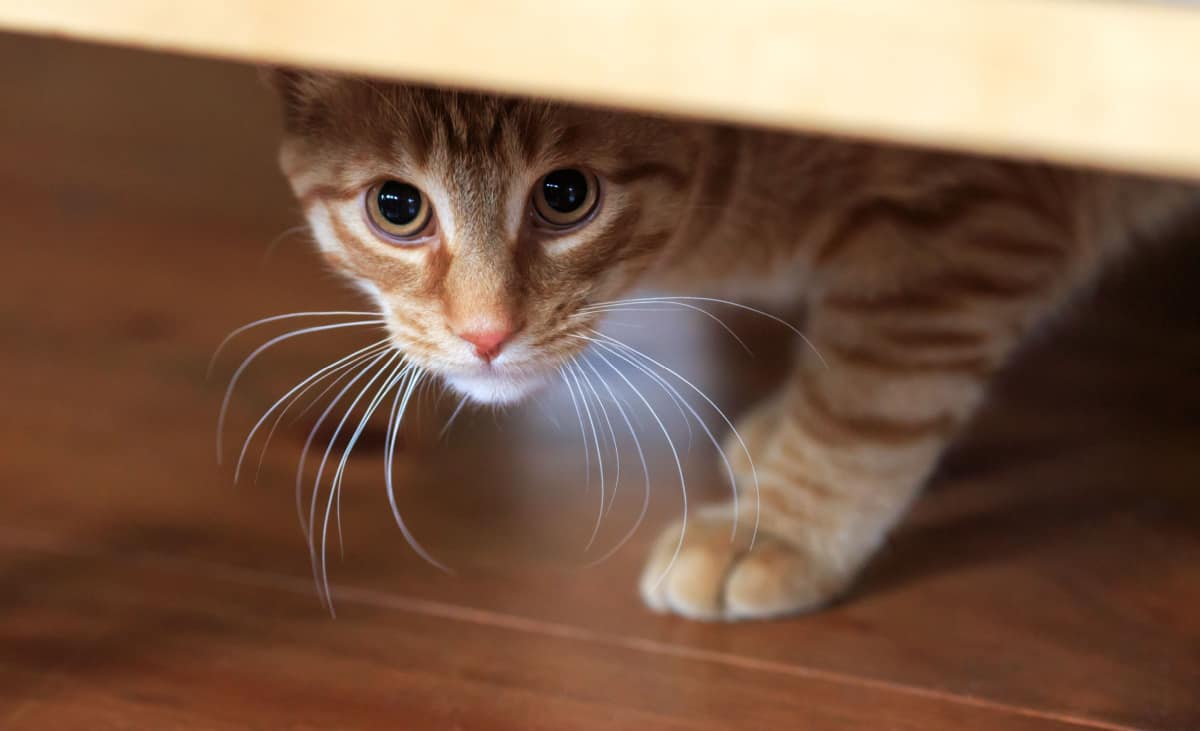Welcoming a new cat into your home is an exciting milestone, filled with anticipation and joy.
But what if your new feline friend is hiding under the bed, seemingly overwhelmed by their new surroundings?
It's common to hear owners exclaim, "My new cat won't come out from under the bed!" But don't worry, this is often a natural reaction to a significant change in the environment.
Your new cat may need some time to adjust, and that's perfectly normal. This transition could take days, weeks, or even months.

The good news? You're not alone in this journey, and there's plenty you can do to support your new companion as they become a beloved member of your household.
In this guide, we'll explore practical tips and insights to help your new cat feel at home, so you can enjoy the happy celebration you deserve.
1. Realize How Stressful The Situation Is For Your Cat
Your new cat's world has been turned upside down. Your new cat was cut off from a familiar environment, whether it was a shelter cage, another home, or even the street.
Now, in an entirely strange and foreign place, they need to establish their territory and get to know you and other members of your household.
It is an immensely stressful situation for any cat. The older the cat, and the more used to its former territory, the higher the stress levels.
2. Address Any Health Issues
Depending on where they came from, new cats can have all sorts of health issues. A veterinary examination to diagnose and treat problems is a good idea.

Keep in mind that the added stress of the move into your home can in itself trigger health problems.
At the same time, existing health problems can add to the cat's stress levels, so it's a two-way street here.
Be aware of possible health problems and address them in time.
3. Consider The Cat's Innate Temperament
No two cats are absolutely alike, and your cat has its own character. He or she may turn out to be a shy cat by nature or an outgoing in-your-face cat that's constantly demanding attention.
Either way, some of the behaviors you're seeing during the first few days and weeks may change down the road. Others may not.
Accept that Kitty has a personality and that the only way to establish a solid long-term relationship is by respecting your cat's quirks.
When you adopt from a good shelter or fostering setup, the volunteers involved should be able to tell you more about your new cat's character.
However, some things may only be revealed once the cat has settled into a real home and feels comfortable enough to reveal its true colors.
4. Set Up A Safe Room
For many cats, limiting their initial space to one room can help reduce stress.
With fewer places to explore and fewer disturbances or perceived threats, the cat is more likely to de-stress and regain her or his composure.
A safe room is especially needed if your new cat is a young kitten.

A kitten's curiosity can spell trouble, and you might be surprised to know just how many people manage to lose their kittens in their homes during those first days.
Limiting a kitten to one room allows you to fully kitty-proof that room to the point where you can leave him or her unattended.
5. Keep It Quiet
Some cats are more sensitive to noise than others. With a new cat, keeping your voice down and avoiding startling noises is always a safe strategy.
Sensitivity to loud noises may be a temporary trait that will go away as your cat settles down, or it may be a permanent part of your cat's character. Only time will tell.
6. Give Time To Help A New Cat Adjust To The Environment
Your cat's brain has to create many new connections, literally. Neurons are forming new connections to help your cat know where things are and how to manage living in this new environment.
Give the cat time to explore his or her surroundings gradually. Everything will take days and possibly longer to become familiar enough, to the point of kitty feeling "at home."
7. Give The Cat Time To Adjust To You
Yes, adjustment to the environment comes first, but next is the time to get used to the new human! Monitor your cat's reactions to your presence and move ahead accordingly.

If your cat seems more interested in exploring the house, that's perfectly ok. Give him or her the time to do so and offer your companionship and attention without forcing them on the cat.
Be extra patient if you're dealing with a shy cat that hides away from you. Sitting on the floor and spending time in the cat's presence without direct interaction is a good way to help Kitty adjust.
8. Manage Introductions With Your Other Cats The Right Way
Bringing a cat into a new territory is stressful enough. When that territory is already occupied by another cat, or more, your new cat can quickly become overwhelmed.
Never drop a new cat into a home with other cats. Cat-to-cat introductions must be done correctly, slowly, and with much patience.
During the first few days, your new cat will have to be separated from the other cats entirely, until he or she settles down. Only then can you start the introductions.
SIGN UP FOR THECATSITE'S EMAIL UPDATES >
9. Pay Special Attention To Interactions With Dogs And Kids
During the sensitive adjustment period, you should limit encounters with anything unexpected and scary.

This means interactions with dogs and children, especially toddlers, should be carefully monitored.
Take the time to introduce canines and younger humans properly to your cat, and then keep an eye on them to ensure the interactions stay low-key and appropriate for the cat's comfort level.
10. Provide Good Nutrition Without Overwhelming The Cat
That you should provide a cat with good nutrition is pretty self-explanatory.
That isn't to say there's one way of doing that, but rather that most owners understand the importance of choosing the right food for your cat.
The key to not overwhelming your cat lies in understanding that changes, including nutritional changes, are stressful to both body and mind.
That's why it's always better to start with the same kind of food Kitty is already used to (if you know what that is).
If you want to improve on that, wait a few weeks until you see the cat has acclimatized. Otherwise, you're introducing one more stress factor into an already stressful period, and that's a recipe for trouble.
11. Offer A Good Litterbox Setup
A single litterbox is probably enough as long as your cat spends time segregated in one safe room. Stick to the type of litter Kitty already knows (if you know what it is).

Once Kitty has reign over the rest of your house, ensure you provide enough litterboxes and offer a good setup from the beginning.
Litterbox-related stress is something you want to avoid with a new cat, so take the time to learn all you can about how to set up the litterbox.
12. Set The Rules - Gently
Different households have different rules. For example, kitchen counters may be ok to jump on, or they may be off-limits.
The same goes for sleeping with you in bed, waking you up at night, begging for food, etc.
It's ok to have house rules, and cats can adjust to sensible ones (if you're not sure what's sensible, ask us at the cat behavior forums).
The key here is to avoid disciplining your cat. Use only positive reinforcement and avoid anything which may stress your cat.
It's a good guideline for later down the road and a crucial one for those sensitive early days.
13. Be Patient
Adjustment to a new home takes time. The older the cat, the longer it can take. Some cats take months and even years to feel at home in a new place fully.

Keep things as stress-free and relaxed as possible, and you stand a better chance of a faster, happier adjustment process.
Ensuring A Smooth Transition For Your New Cat
Bringing a new cat into your home marks an exciting, yet delicate, chapter in both your lives.
The transition may challenge you, but with the right approach, understanding, and practical tips in this guide, you can easily help your new cat adjust.
Every cat has a unique personality, so tailor your efforts to meet your new friend's needs.
Communicate openly with everyone in your household, watch your new cat's progress, and seek professional advice, if necessary.
Your dedication will forge a harmonious relationship with your furry companion, making your house the perfect home for your new cat. Here's to the beautiful journey ahead!
SIGN UP FOR THECATSITE'S EMAIL UPDATES >
Good luck! And don't forget to let us know how you're doing by posting your question in the cat forums!
Read more:
10 Must-Know Tips For Happy Living With A Shy Cat
How To Safely Introduce A Cat And A Dog, Cats And Kids Making Introductions
Note: We may get commissions for purchases made through links on this page.




9 comments on “How To Help A New Cat Adjust To Your Home”